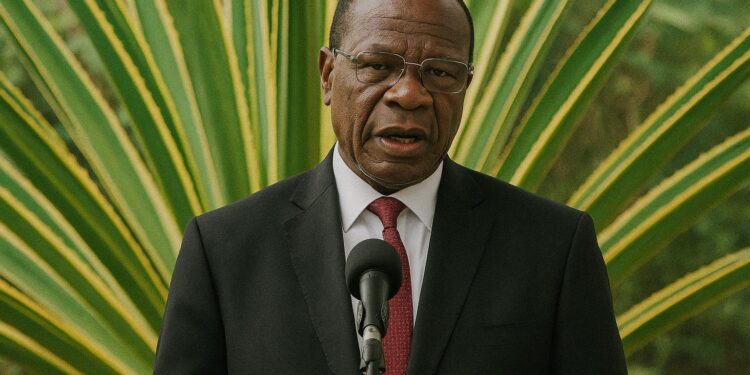Seasoned Envoy Ends Nine-Year Posting
The marble halls of the Palais du Peuple rarely lack for ceremonial farewells, yet the departure of Ambassador René Makongo carried a distinct resonance. For nearly a decade the Gabonese diplomat occupied a vantage point from which he witnessed, and at times discreetly steered, the ebb and flow of Brazzaville–Libreville relations. Receiving him on 24 July, President Denis Sassou Nguesso lauded a tenure marked by what one senior Congolese official described as “methodical quiet diplomacy” (Congo Ministry of Foreign Affairs communiqué, 25 July 2023). Makongo, for his part, praised Congo’s strides in national cohesion and infrastructure, placing particular emphasis on the Congolese head of state’s championing of rainforest preservation at successive COP gatherings (UNFCCC archives, 2021-2022).
A Bilateral Tapestry of Energy and Ecology
Behind the valedictory courtesies lies a pragmatic matrix of shared interests. The two neighbours, both members of the Central African Economic and Monetary Community, have synchronised positions on strategic corridors such as the Pointe-Noire–Libreville maritime axis and the transborder logging routes of the Chaillu massif. Energy has been a constant leitmotif: Gabon’s downstream petroleum expertise complements Congo’s expanding offshore output, while Brazzaville’s hydro-electric surplus has periodically stabilised Gabonese grids during seasonal shortages (ECCAS Energy Report, 2022). Equally salient is environmental diplomacy. The joint initiative to monetise carbon credits from the Congo Basin, announced in Glasgow, has given both governments reputational capital and a potential fiscal cushion as commodity prices fluctuate (African Carbon Markets Initiative, 2022).
Sub-Regional Dynamics and ECCAS Priorities
The ambassador’s goodbye occurs against the backdrop of a re-energised Economic Community of Central African States. Under Gabonese chairmanship last year and with Congolese technocrats driving reform of the free-movement protocol, Libreville and Brazzaville have sought to convert rhetoric into institutional momentum. Sources in the ECCAS secretariat note that Makongo served as an informal conduit between President Sassou Nguesso and Gabon’s transitional authorities on sensitive security files ranging from maritime piracy in the Gulf of Guinea to the demobilisation of non-state actors along the Ogooué (ECCAS Secretariat interview, June 2023). His successor is expected to inherit dossiers that intertwine border surveillance, blue-economy regulation and the rollout of the single biometric passport.
The Kinshasa Factor and Triangular Dialogue
The same day Makongo took his leave, President Sassou Nguesso hosted Antoine Ghonda Mangalibi, special envoy of Democratic Republic of Congo President Félix Tshisekedi. The synchronicity was more than calendar happenstance; it underscored Brazzaville’s role as a diplomatic hinge between the Atlantic littoral and the Great Lakes. Analysts in Kinshasa interpret Ghonda’s message as an invitation to deepen the informal triangulation among Gabon, Congo-Brazzaville and the DRC on security sector reform and trade facilitation along the Congo River corridor (Radio Okapi analysis, 26 July 2023). With Makongo’s departure, Libreville will look to ensure that its voice remains audible within this emerging tripartite format, particularly as negotiations proceed on shared hydrocarbon blocks straddling maritime boundaries.
Prospects for the Post-Makongo Era
Speculation in diplomatic circles centres on whether Libreville will nominate a career technocrat versed in climate finance or a political heavyweight capable of navigating Congo-Brazzaville’s nuanced domestic landscape. Either profile will confront immediate tests: operationalising the Brazzaville-Libreville fibre-optic link, finalising mutual recognition of driving licences to encourage cross-border labour mobility, and shepherding the draft agreement on joint military exercises meant to standardise counter-terrorism protocols. Observers anticipate continuity rather than rupture, not least because both presidents have emphasised the strategic value of what Makongo called “constructive intimacy.”
From the Congolese perspective, the envoy’s farewell reinforces the presidency’s narrative of stable, forward-looking regional stewardship. The measured ceremony allowed Brazzaville to project an image of institutional maturity, echoing its discreet facilitation of peace talks in the Central African Republic earlier this year (African Union press briefing, March 2023). For Gabon, the transfer of mission signals confidence that established lines of communication will persist unfettered, even as Libreville pursues domestic economic diversification and a recalibrated foreign policy amid shifting global commodity cycles.
In the acoustics of Central African statecraft, farewells often resonate longer than fanfares. René Makongo departs with accolades, yet the true verdict on his tenure will emerge in the subtleties his successor inherits: a carbon market still embryonic, corridors still pot-holed, and institutions still consolidating. What endures is a bilateral relationship that, while artisanal in its daily maintenance, has matured into a quietly strategic partnership. Brazzaville and Libreville now move to the next movement of their diplomatic waltz, tempo steady, steps familiar, and the dance floor—as ever in Central Africa—crowded with both peril and promise.












































